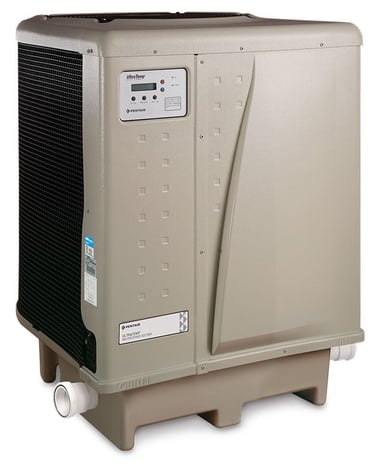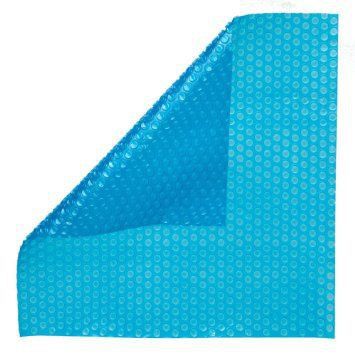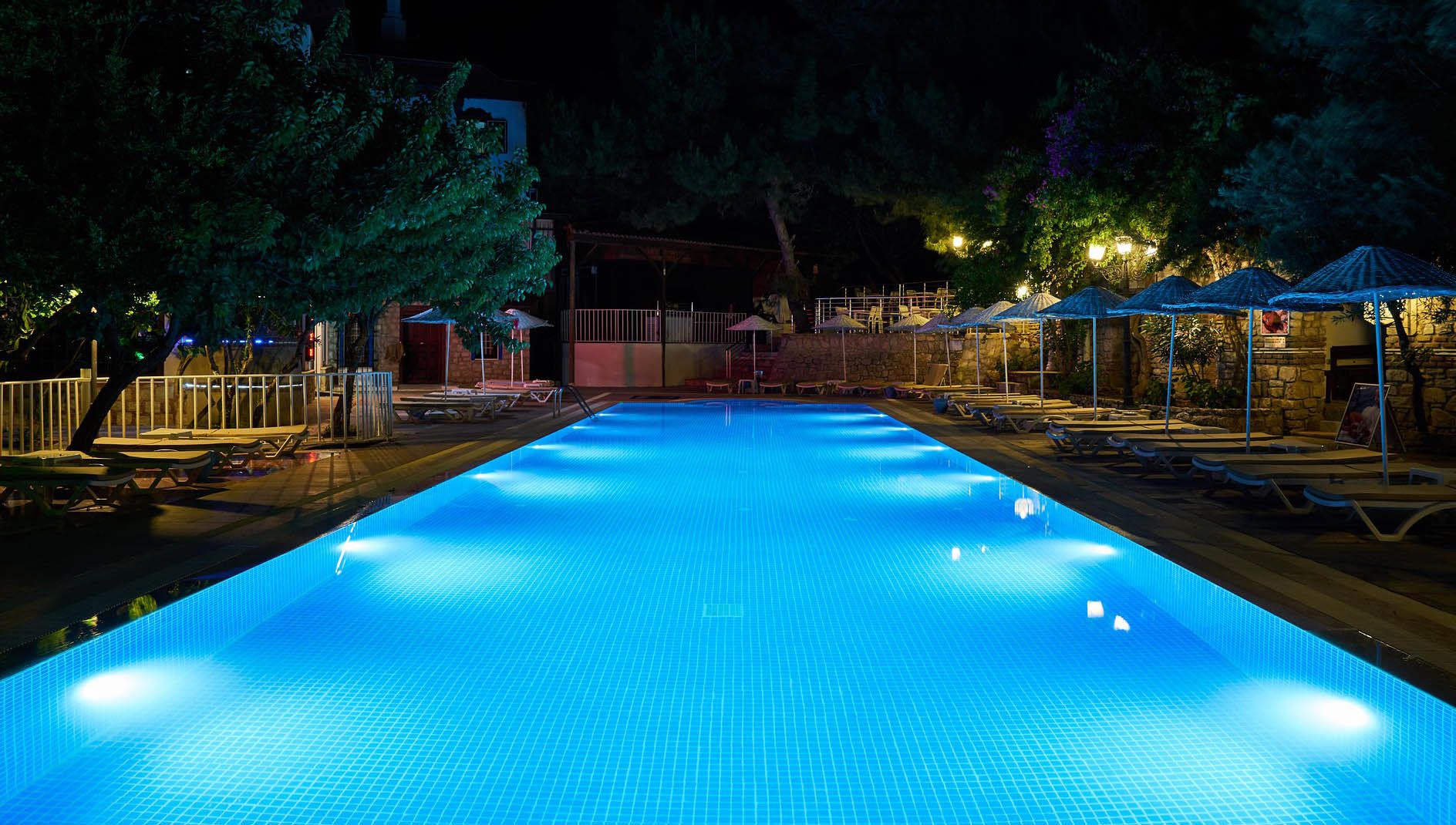
Imagine it: the sun's shining on a beautiful blue summer day. Your inground swimming pool is sparkling clean and crystal clear. You've got your favorite swimsuit on and it's time for a swim.
But when you test the water with your foot, you realize... the weather might be amazing, but your pool water is still ice cold.
Most pool owners have had a similar experience on days when it otherwise seems like the perfect time to swim. It can be unbearably frustrating... but it is fixable, if you have a swimming pool heater.
A pool heater can help you bring up the temperature of unexpectedly chilly pools on a deceptively warm day. If you've never used a pool heater before, you've probably got a few questions... such as how much they cost, which type of pool heater is the best choice for you... and perhaps most importantly, do you even really need a swimming pool heater in the first place?
River Pools specializes in fiberglass pools. We're experienced pool pros, but we're also educators, and we want every customer and pool owner to know as much as possible about their pool purchase -- and any accessories they may need to make the most of their swim season.
In this article, we’ll take a closer look at the three main types of inground pool heaters you can use to keep your pool water warm, and how much each type typically costs to buy upfront and to run over the long term. We'll also examine the pros and cons of having a pool heater at all, and you'll also see a few alternatives to powered heaters if you've got a tighter budget.
Let’s start with the basics.
Types of swimming pool heaters
There are three main types of powered swimming pool heaters:
- Solar pool heater
- Electric heat pump
- Natural gas or propane pool heater
Each type of heater has a somewhat different mechanism of operation, which means each type has its own set of pros and cons.
Let's take a closer look at the different types of pool heaters, what you might expect to pay for each, and how much each type typically costs to run over a swim season or year.
Note: There are other types of pool heating systems, like wood burning stoves and electric resistance heaters. These are rarely used to heat residential inground pools, which is why we tend not to cover them. Let's stick to a detailed explanation of solar, heat pump, and gas heaters.
Solar pool heaters
Solar pool heaters are essentially solar panels through which pool water circulates so it can be heated. The solar heater's panels are installed on the roof of your house, and will absorb heat and energy from the sun, which is then transferred to the pool water through a circulation system.
You might think you'd need to live somewhere with plenty of sunshine to use a solar heater effectively. Well... you're right. But that's not the only condition you need to meet to make good use of a solar pool heating system.
You’ll also need lots of space.
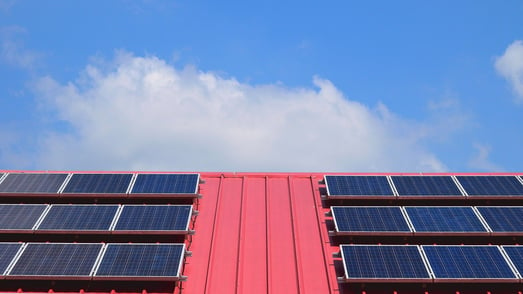
If you don't already have roof-mounted solar panels, you ought to have plenty of space. If you've already got solar panels (or anything else) on a good chunk of your roof surface, things may be a bit trickier.
So how much space do you really need for a solar pool heater?
Solar heating systems often need at least half as much surface area as the pool itself -- but solar pool heaters can sometimes take up more surface area than the full size of your pool. Keep this in mind if you want a solar pool heater and are still trying to figure out the design, size, and material of the inground pool of your dreams. For example, a 16' by 40' rectangular pool may require solar heating panels that occupy at least 8' by 40' of roof space.
Still trying to figure out which type of pool might be best for your backyard before you take the plunge on a pool heater? Take our Pool Type Quiz! You'll get insight and ideas with just a few clicks -- tap the button below to start your personalized quiz now:
Solar pool heater costs
The beauty of solar heating systems is that solar energy is essentially free.
However, the electricity required to pump water through your solar heater isn't free. A pump is necessary to circulate your pool’s water through the solar heating system.
In most parts of the country, you might expect to pay between $300 and $950 per year to pump water through your solar pool heater.
This range is, of course, a very general estimate, and your true costs depend heavily on where you live, your utility rates, and how often you run the pump for your solar pool heater.
Solar pool heater installation
You can expect to pay between $3,000 and $4,000, and sometimes a fair bit more, to install your solar pool heater. This is particularly true when working with professional installers -- which we recommend as a general rule, since most pool heaters tend to require electric and plumbing skills to set up properly.
The labor costs to install your pool heater might add a fair bit to your upfront bill, but we think it's worth it when you consider how much a well-done installation can save in terms of long-term maintenance, repairs or replacements, and any wasted electricity or fuel you might end up with from incomplete or leaky connections at any point between the outlet and your pool.
Remember, your solar heater's panels will need at least half the surface area of your pool, so it’s not going to be the cheapest option upfront.
Keep in mind: solar panels typically require permits and inspections before they can be installed and used. The actual installation process for most solar pool heater panels, and their associated pumps and plumbing connections, typically takes between one to three days, though they can take longer for a variety of reasons, which mostly involve:
- Mounting your solar panels on the ground instead of a roof
- Repairing or reinforcing your roof to hold solar panels
Solar pool heater pros and cons
Now that you know how much a solar pool heater might cost, let’s look into some of the pros and cons of going with this type of pool heater.
Pros of solar pool heaters:
- Environmentally friendly
- Relatively inexpensive to run
- Long lifespan (typically 15-20 years)
- Can extend swim season by several weeks
- May be eligible for a solar tax credit
Solar panels largely operate on free heat and energy from the sun, which makes them more environmentally friendly and less expensive to run than other types of pool heaters.
A well-maintained solar pool heater system can last several decades if properly cared for. These systems can potentially extend your swim season by at least a few weeks in the spring and fall.
Installing a solar heating system may make you eligible for solar tax credits. The laws around solar tax credits change rather often, so make sure to check state and local laws and energy regulations, and contact your local building authorities if necessary, to determine whether or not you're eligible for a tax credit -- and if so, how much you can get.
Cons of solar pool heaters:
- Expensive to install
- May take longer to install than other heaters
- Dependent upon the sun
- May heat water slowly
- Uses a large area (50% to 120%+) of your pool's surface to operate
Solar pool heaters tend to not come cheaply. Even with a tax credit, you’ll still be paying thousands of dollars, especially with professional installation.
If your roof needs work or you decide to mount your heating system on the ground, the installation timeline can be extended by several days or even weeks.
Solar heaters also need sunlight to operate properly. They simply won’t work well in cloudy weather, and they won’t work at all overnight. Solar pool heaters may also take longer to heat the pool water, especially when using unglazed solar panels, which are cheaper than the glazed alternative. Finally, your solar pool heater will require a lot of space, particularly if you have a large pool.
Electric heat pumps
Electric heat pumps for pools work by pulling heat from the air to heat the pool water.
This technically means that electric heat pumps use a type of solar energy, since they depend on reasonable surrounding air temperature to work effectively. Electric heat pumps tend to require an ambient air temperature of at least 55 degrees Fahrenheit for effective heating.
Note: Some electric heat pumps have newer technology, such as scroll compressors that can effectively heat your pool in lower outdoor air temperatures.
Electric heat pump costs
Electric heat pumps typically cost around $175 to $600 or more per month to operate. This reasonable ongoing cost makes electric pool heat pumps among the most cost-effective pool heating systems available today.
This lower operating cost is in large part due to the pumps' greater energy efficiency. Using an electric heat pump can also be a viable choice for environmentally conscientious pool owners.
Electric heat pump installation
Electric heat pumps don’t take very long to install, but they can be a bit pricey.
Most electric heat pumps will cost between $2,000 and $7,000, if not more -- particularly when including the cost of installation, with professional electric and plumbing hookups.
However, it's worth remembering how much money you’ll save over the long term with the electric heat pump's lower monthly operating costs.
Electric heat pump pros and cons
Now that you have a rough idea of how electric heat pump pool heaters work and how much they cost, let’s get into a broader range of benefits and drawbacks to owning an electric pool heat pump...
Pros of electric pool heat pumps:
- Energy efficient
- More environmentally friendly than gas heaters
- Long lifespan (usually last between 10 to 20 years)
- Lower monthly costs than gas heaters
- Can extend swim season by several weeks
The fact that electric heat pumps rely on the warmth of the surrounding air makes them more energy efficient and environmentally friendly than gas heaters. This upside isn't without its drawbacks, as we'll explain in just a moment.
Electric pool heat pumps also have long lifespans, ranging from about 10 to 20 years and guarantee relatively low monthly operating costs. Like other pool heaters, they can extend the swimming season by several weeks to several months, depending on the area.
Cons of electric heat pumps:
- Expensive to purchase and install
- May heat pool water slowly
- Typically can't work in outside temperatures below 55 degrees Fahrenheit
Electric heat pumps can be a costly addition to your backyard oasis, and they can also take longer to heat your swimming pool water than gas heaters. Electric heat pumps tend to not work when the air temperature dips below 55 degrees Fahrenheit, which means they won't typically operate effectively (if they'll operate at all) in colder weather.
The minimum outdoor temperature is a major factor in determining how long this type of pool heater will be able to extend your swimming season. In some areas with wild day-to-night temperature swings, such as the Southwest desert states (Arizona, Nevada, etc.), you might not be able to use your electric heat pump at night, even if you were roasting all afternoon.
Gas pool heaters
A typical gas pool heater burns either natural gas or propane in a combustion chamber.
This heats copper coils through which your pool water circulates, quickly warming the water as it returns to your pool. Unlike solar pool heaters and heat pumps, a gas heater doesn’t rely on sunlight or air temperature to operate, which can make them more appealing to people living in colder climates -- or to anyone with a driving need to keep their pool nice and toasty all the time.
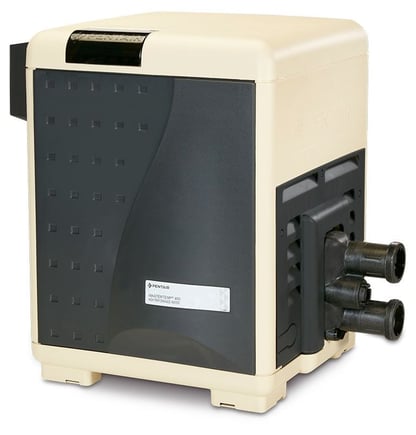
Gas pool heater costs
Let’s not sugarcoat it: gas pool heaters can be expensive.
On average, it's likely to cost you anywhere from $200 to $850 per month to run a gas heater, if not more -- all-day heating can use a lot of fuel.
Of course, you don’t have to run your pool heater all season, particularly not during the peak of summer swim season when temperatures are at their hottest.
However, when you do run a gas pool heater, it will cost more than a solar heater or electric heat pump on an hour-by-hour, gallon-by-gallon basis (or by whatever other fancy calculation you may want to use to justify the costs of one heater over the others.
Keep in mind that propane typically costs twice as much as natural gas, and will increase your costs accordingly. Most gas pool heater owners prefer to connect their heaters to direct gas lines to make use of utility rates, as the propane alternative can be costly and cumbersome.
Gas pool heater installation
Good news! Gas pool heaters are relatively inexpensive to install, starting at $1,500.
Prices for gas pool heaters can range from $1,500 to $6,000 on average, with larger pools requiring more powerful and expensive heaters.
Gas pool heater pros and cons
Gas pool heaters may not be quite as popular as they once were, but they still have certain undeniable advantages. Let’s explore the pros and cons of this heater type in more detail...
Pros of gas heaters:
- May be less costly to purchase up front
- Doesn’t require sunlight or warm air to operate (works in any environment)
- Heats pool water quickly
One of the main benefits of gas pool heaters is their comparatively lower upfront installation cost. Many pool owners save thousands by choosing to install a gas pool heater instead of a solar heater or electric heat pump.
Gas pool heaters also work in any environment, regardless of the ambient air temperature, the season, cloud cover, time of day, or even the weather. This workhorse all-environment quality makes gas heaters the perfect choice for areas with long stretches of cold weather, and for dedicated night swimmers who need that warmer water.
A gas heater will also heat your pool quicker than a solar heater or electric heat pump.
Cons:
- Less energy efficient
- Not environmentally friendly
- Can be much more expensive to run
- Shorter lifespan (more frequent replacement)
Needless to say, gas pool heaters are less energy efficient than solar heating systems. Their fuel emissions also make them the least environmentally friendly of the three types of pool heaters.
Gas heaters have higher operating costs than other pool heater types, mainly because natural gas and propane will be more expensive than electricity. Most gas heaters have much shorter lifespans than other types of heaters -- they tend to only last for about five years.
What size pool heater do I need?
Pool heaters are usually rated by BTUs, or British Thermal Units.
The more BTUs your heater is rated for, the quicker you can expect it to heat your pool. Conversely, larger pools will need higher-BTU heaters, since you may otherwise wind up waiting too long for your pool water to come up to the proper temperature.
Keep in mind your ideal pool temperature, and try to figure out how long a given heater with a given BTU rating might take to achieve it.
As a general rule, your pool heater’s output should at least 50,000 BTUs for every 10,000 gallons of water in your pool. For example, a swimming pool with 20,000 gallons should have a total heater output of at least 100,000 BTUs.
Do I really need a pool heater?
We've found most pool shoppers prefer to have a pool heater installed if they have the opportunity. However, the upfront and ongoing costs of swimming pool heaters can be major deterrents to pool owners and prospective buyers.
The real question we're often called on to ask is simple: do I need a pool heater?
Generally, most outdoor pools don’t need heaters, especially in warmer climates. In some of the more northerly (or generally colder) areas, pool heaters can be virtually a requirement to make your pool water comfortable enough to swim on a regular basis.
If you've got an indoor swimming pool, you'll need a heater -- you can’t rely on the warmth of the sun to heat the water, and you’ll need to be able to regulate the pool water temperature to properly control the humidity in the indoor pool environment.
To decide if a pool heater is right for you, ask yourself these questions:
- Is your pool indoors?
- Are you planning to enclose your outdoor pool?
- Do you strongly prefer to swim in warmer water?
- Will children or older adults be using your pool?
- Do you want a longer swim season (a few weeks to a few months)?
- Can you afford thousands of dollars in upfront costs, and hundreds in monthly or yearly ongoing costs, to keep your pool water warm?
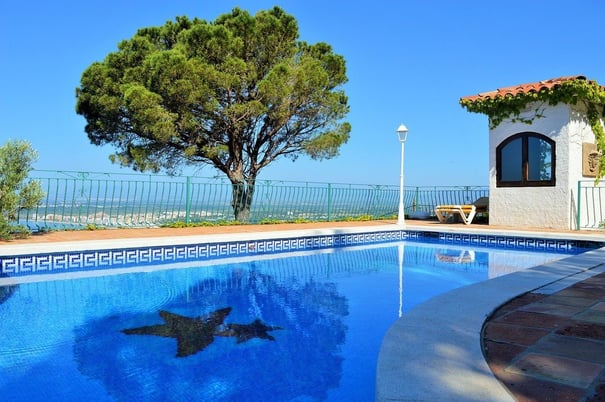
If you answered “yes” to all or most of these questions, you might want to explore your options and start shopping around for a pool heater. We've written reviews of some top pool heaters on the market.
If you don't mind the occasional dip in chilly water, and/or you're at peace with the idea of closing your pool when outside temperatures start to fall (or before they're warm enough), you can skip the pool heater and put one in later if you find that your pool is too cold for your liking.
Pool heater alternatives
Not ready to get a pool heater, but still want some way to heat your swimming pool and stretch out your usable swim season?
Well... don’t throw boiling water in your pool. You wouldn't expect this sort of thing to come up in the pool biz, but it has. We can say from experience that this approach doesn’t work, and it's actually rather dangerous.
So let's all turn our stoves off and take a look at a few safe and effective ways to raise the temperature of your pool water.
How to warm up your pool water
- Make sure your pool gets plenty of sunshine.
- Try removing trees and any other shade-creating plants or structures near the pool.
- Try using a solar pool cover -- it absorbs the sun's warmth while trapping heat in the pool.
- If you don’t want to get a solar cover, you can place solar rings over the top of the pool to help absorb some warmth into the water.
- Shield your pool from the wind. Wind cools your pool water as it blows over the surface, so wind blockers can help retain heat if you live in a windy area.
- Heating mats can circulate pool water through mats warmed by the sun. They work best with smaller pools.
Solar pool cover
Pool heater FAQ
How hot does my pool water need to be?
This answer depends on your preferences and on how you plan to use your pool.
Generally, we recommend pool water be kept around a minimum of 75 degrees Fahrenheit to be considered "comfortable" by most people.
However, young children and older adults may want water that's at least 80 degrees Fahrenheit (26.7 Celsius) to swim comfortably.
The National Swimming Pool Foundation's official recommendations are for pool water temperatures of 82 degrees Fahrenheit for recreational swimming, and for 90 to 93 degrees Fahrenheit (32.2 to 33.9 Celsius) for children ages four and younger.
Can I use any pool heater with any type of pool?
Yes.
Solar pool heaters, electric heat pumps, and gas heaters should all work just fine with vinyl liner, fiberglass, and concrete swimming pools.
Can I install a pool heater later?
Absolutely!
In fact, skipping the heater add-on during your pool installation project and installing it later has been an easy and common way for many pool owners to save on the upfront costs of buying an inground pool.
If you want getting a pool quickly and you've got a smaller budget, here are some more tips on how to get an affordable pool fast.
What causes heat loss in pool water?
According to the National Swimming Pool Foundation, the main reasons pool water loses heat are: evaporation, convection, thermal radiation, and conduction.
Water at the surface is continually converted to water vapor by the sun and the heat of the environment -- evaporation is one of the primary causes of heat and energy loss. This is why we often recommend pool covers, to help prevent evaporation and maintain warmer water.
Convection losses happen when heat from the surface of the water dissipates into the surrounding air. Thermal radiation happens when the warmer pool water radiates heat to the cooler surrounding air.
Conduction losses happen when movement of heat through an inground pool's structural components cool down the pool water -- this is why pools with water features like pool waterfalls or pool fountains are often used in hotter climates, as their water-circulating functions can lower the temperature of an overly-warm pool.
How do I calculate pool volume in gallons?
If you want to size your pool heater and you’re not sure what your pool’s volume is in gallons, an easy way to calculate it is to multiply the length by the width to get the area, then multiply the area by the average depth. Finally, multiply that number by 7.5. Here’s how the formula looks:
Pool volume (gallons) = (LxW) x average depth x 7.5
To get the average depth, you can add the shallowest depth in your pool to the deepest depth and divide that by two. Let’s say your pool is 3 feet at the shallow end and 6 feet at the deep end. Your average depth would be (3+6) ÷ 2 = 4.5 average depth. This formula works best with pools that have a constant slope. If your pool has a hopper bottom or varying depths throughout, you can divide your pool into sections to make calculating the volume easier.
Dividing the pool into sections also works well for freeform and irregular shaped pools.
Have more questions about pool heaters? Leave them for us in the comments and we will answer them as soon as possible!
At River Pools, we manufacture world-class fiberglass swimming pools for customers across North America. If you're interested in getting a fiberglass pool for your home, feel free to browse our catalog of models, try out our pool pricing calculator, or request custom pricing using the button below!
Up Next:
Best Pool Heater Option: Gas/Propane vs. Heat Pump vs. Solar
Swimming Pool Covers: The Good, the Bad, and the Ugly
How to Prepare for a Pool: Inground, Above Ground, Indoor, and Rooftop
Editor's note: This article was originally written by Jason Hughes and was updated on March 25, 2025, with current information. River Pools is a brand of inground fiberglass pools produced in a manufacturing facility in Fortville, IN. While our expertise is in manufacturing fiberglass pools, we have access to a network of installers with expertise relating to project design, installation, and pool service. We often tap into this knowledge base and share information freely with homeowners, just like you, considering installing a swimming pool in your backyard.


